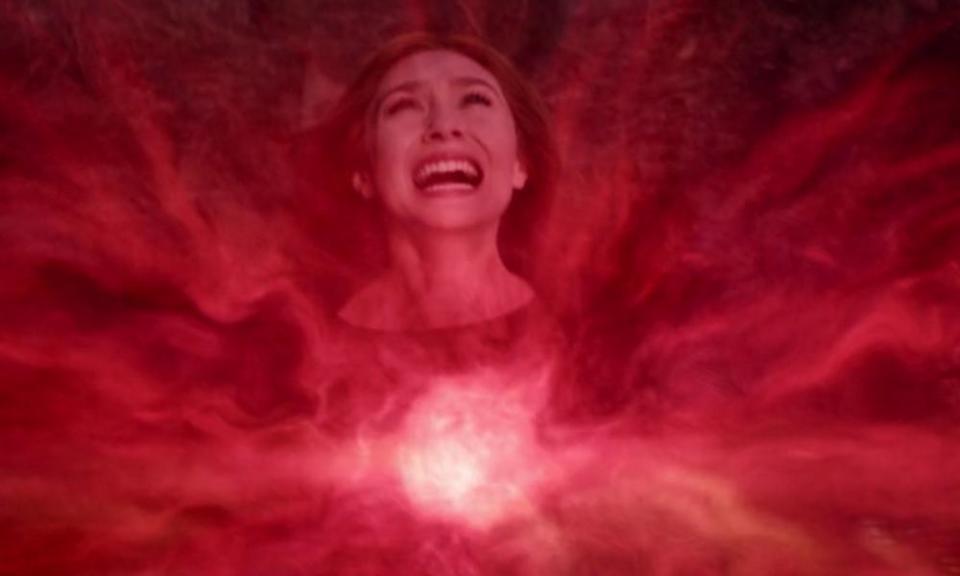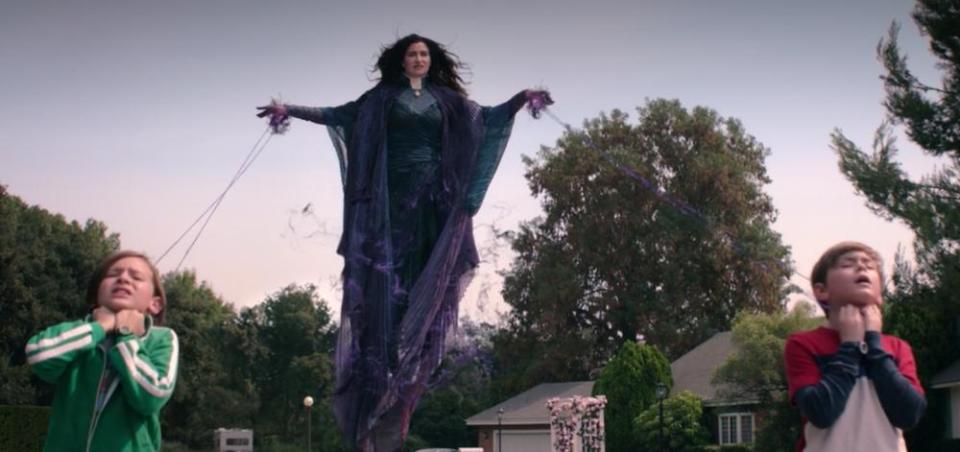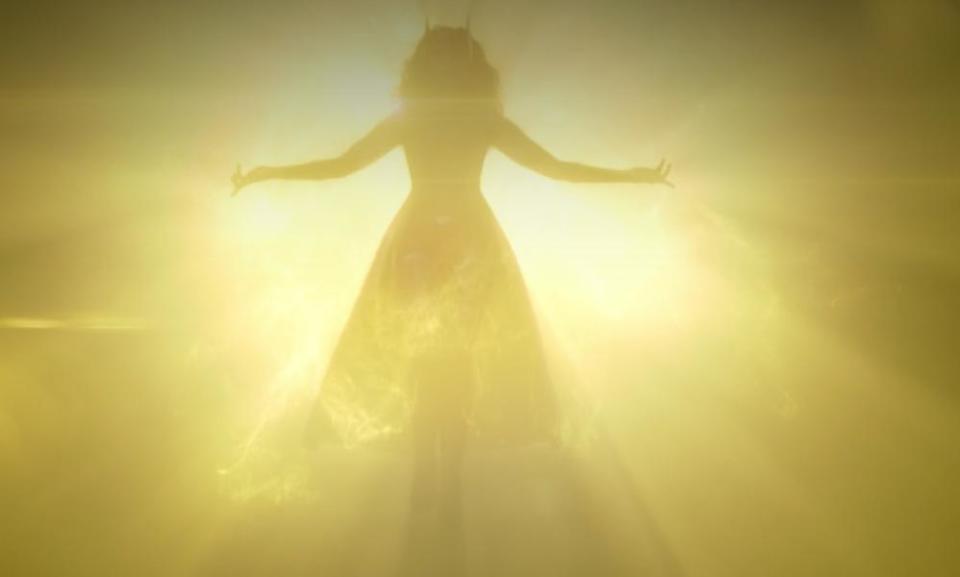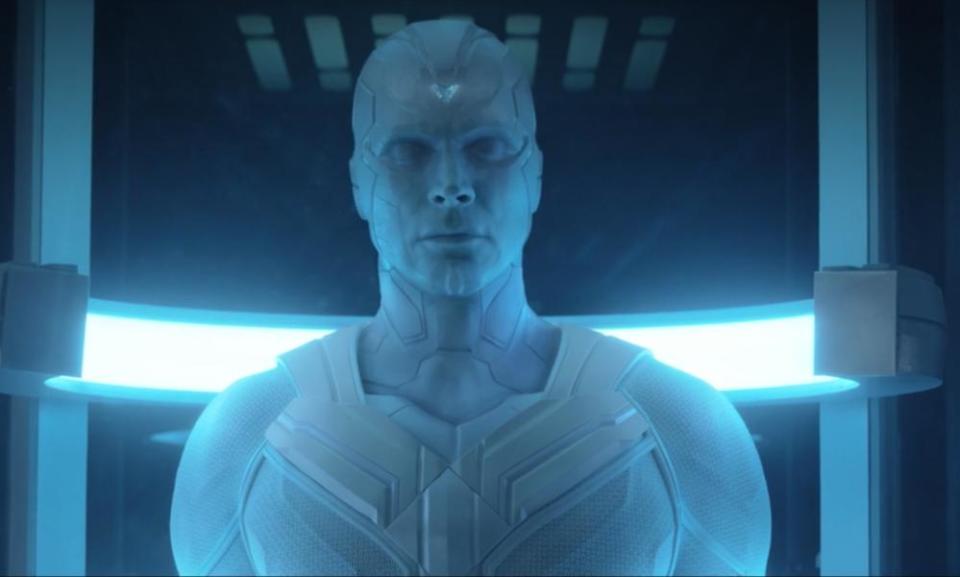WandaVision episode eight: which witch will come out on top?

Spoiler alert: This blog is for people watching WandaVision on Disney+. Do not read on unless you have watched episodes one to eight.
‘That makes you the Scarlet Witch’
“When I sensed this place, the afterglow of so many spells cast all at once …” Agatha’s Exposition Hour drops most of the WandaVision puzzle pieces into place,not least the clarification that the show we’ve been watching really was Wanda’s creation all along.
The big jump here, though it might not feel like it, is the acknowledgment that this is magic. In the Marvel Cinematic Universe, Wanda is the product of scientific experiments with a cosmic rock – fantasy sci-fi, but still leaning harder on the sci than the fantasy.
Turns out a big card WandaVision has been hiding in plain sight is the character’s discovery that she was, in fact, a magical being. And it’s not just the mind stone that did this – Wanda’s been doing probability spells since she was a child. She just didn’t know.

There is a fumbled ending, though – suddenly Agatha has the twins on the end of magical throttling strings as if she has had to make this sudden choice to gain the upper hand, rather than being fully in control of Wanda for 40 minutes of chat and flashbacks. But even that is perked up by “That makes you the Scarlet Witch” – implying that, as in the comics, Scarlet Witch is a legacy name that Wanda is just the latest to own. Though she’s yet to claim it.
Full of holes
Agatha’s role over the past seven episodes is at last (kind of) explained: “I tried to be gentle, to nudge you awake from this fantasy …” Turns out the power of the magic is what drew Agatha here, and her role in the sitcom was her trying to suss out the source of Wanda’s power, and when that wasn’t forthcoming, she started trying to break Wanda out.

Whether you find this reason enough for Agatha to “do a John Harrison” (from Star Trek Into Darkness, which gave that banal name to Kahn to avoid revealing his identity, even though the name would mean nothing to the characters in the film – see also Oberhauser/Blofeld in SPECTRE) is up to you. Wanda asking “Who are you?” after the name reveal shows how daft this kind of audience-facing secrecy feels. But, like Loki, there’s a sense Agatha’s in this for the fun as much as for the outcome. Sure, there are easier ways to do this … but would she enjoy them as much?
In her magical basement Agatha is also laying out just how magic is going to work for Wanda going forward – both in this show and in the wider MCU. There are limits: her fake Pietro (“Fietro”) was a make-do solution when the original brother proved to be inconveniently “on another continent – full of holes.”
Turns out his whole story was a new layer of origin story for Wanda.
wesTView
Speaking of things hidden in plain sight, while it took me until episode five to notice the initials of “WandaVision” and “WestView”, it took a shop front this week for me to spot the extra wordplay of “wesTView”. Well played, writers.
In a first look at what Westview was before Wanda, it turns out to be a fairly dilapidated place before it had its sitcom polish. The oft-seen mailman turns out to be a pizza delivery guy (so is the postman delivering pizzas now?) in a town in disrepair. Maybe it was in better shape when Vision chose this as their place to grow old, or maybe it was just the convenience of the commute to the Avengers compound. (The real reason it’s in such a state is probably to make us feel more OK with what Wanda’s done – it’s not like she ruined millions of happy lives, instead it’s just hundreds of apparently miserable ones.)
Being honest, Vision’s note on their house deed broke me. And as I sat quietly sobbing, Wanda’s reaction felt entirely reasonable: Make it not be this. Grief poured out of her. And so did a replacement Vision. (Thankfully ending one ghastly fan theory that she’d been cohabiting – and in episode two having sex with – his reanimated corpse this whole time.)
But far from presenting grief-stricken hysteria, WandaVision turns out to be the result of something more savvy. The sheer frustration of a life that put Wanda in box after box – trapped in war-torn Sokovia, trapped in Hydra’s experimentation room, trapped at the Avengers compound – then forced Wanda to see her lover’s body treated like spare parts by SWORD.
A lifetime of resentments have been bottled up. As the world asks women to do over and over. Within Wanda’s frustrated life, sitcoms have become a palliative, soothing presence. When her endless efforts to stay calm in a life that would make anyone want to scream finally explode out of her, she turns the world into … well, sadly into another box.
It looks like the aim is to transition Wanda from a SF superhero to a fantasy one. Which is a solid way to make sure this story matters to the growth of the character – expanding her worldview in a similar way to how Captain America: The Winter Soldier affected Steve – and also sets her up nicely for her role in Doctor Strange and the Multiverse of Madness.
Like Monica last week, there’s a whiff of destiny to this, rather than choice. Wanda in this sitcom box (on the box) cannot last. But while Agnes seems to be offering a new world to be part of – albeit couched as less of an offer, more of a magic heist – what she’s really offering is another container. You were magical all along, you are the Scarlet Witch, be what my world defines you as.
If Wanda goes for that deal, one suspects she’s going to change the terms to avoid ever being trapped again.
SWORD off
Showrunner Jac Schaeffer’s approach to superheroes has been to seek alternatives to violence, to glamorising guns and weaponry. “It’s all about inner power,” she said of Captain Marvel in one interview, “and the destruction is not at the expense of human life.”

That approach has become shiningly clear this week as SWORD awaken Vision’s body, devoid of all its colour and now a sickening, zombie-like white. Hayward never saw Vision’s body as a body – here he literally gives its dollar value in vibranium – and it looks like we’ve got another comics riff ready to go. (“Vision Quest” is the story you’re looking for.)
I feel bad for Josh Stamberg, who’s never really had the chance to flesh out “to-hell-with-your-emotions-I-have-a-job-to-do” Tyler Hayward. The writing has never quite seemed to find a mode for him to play, a personality beyond the persona, so he’s stuck within the standard genre schtick – and now relegated to mid-credits plot-building.
Are we meant to read him showing Wanda Vision’s body being tested as indifference, or intentional sadism? Is he trying to push her to respond, to revive the synthezoid, or does he just not know how obscene this all is? For all the smart writing (check out how we’re misled to think Agatha’s flashback is her persecution by witch hunters) I’m not sure there’s a clear take on Hayward – and yet the story is relying on his actions to drive things forward.
Sitcom dreams
Elsewhere, this episode features some of the most beautiful writing of the series as writer Laura Donney (and, I’m sure, the rest of the staff writers) find extraordinary turns of phrase. “What is grief if not love persevering?” is a splendidly simple truth, while “Here you are making breakfast for dinner” is magnificent sneering from Agatha. And oh, the heartbreak in “It’s not that kind of show.”
There’s also a wonderful tracing of sitcom through Wanda’s life. Though forced at first – she’s literally never mentioned any pop culture awareness until now – it becomes clear that all WandaVision is relying upon is the simple truth that these shows are a constant in all our lives. Forever on TV, and almost always reassuring. There’s also a definition of sitcom “shenanigans” that’ll break your heart – a comfort in a happy ending that real life refuses to offer.
The American sitcom has always been a little more … aspirational than its UK counterpart. You want to know Frasier, hang out with the Friends. Whereas over here we tend to focus on showing off the flaws in people you recognise: you don’t aspire to spend time with Basil Fawlty or David Brent.
But there’s still reassurance in knowing that other people work with these nightmares. And both sides of the Atlantic are getting comedy out of the familiar, the lives we wrestle with daily. If we read to know we are not alone, we watch sitcom to know it’s not just us.

 Yahoo Finance
Yahoo Finance 